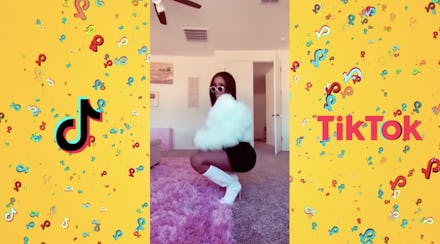The Buss It Challenge is a testament to young Black resilience

This entire week, I’ve been repeatedly rapping the phrase “throw it like a stripper, yuh” — to no one in particular — from Erica Banks’ “Buss It.” Though this behavior is concerning to all of the people I live with, the 2020 single and its catchy phrases has found a new resurgence, both in my brain and on the charts thanks to a TikTok challenge based around it. And while rapping (and attempting to twerk) to the song, I realized that the Buss It Challenge — and glow-up challenges in general — are one of our contemporary, creative responses to negativity. And we need more image boosters and Internet-based identity language like this in the Black community.
Banks’s single on its own, which I’ve listened to approximately 7,063 times since the beginning of the week, has boosted my mood following last weeks insurrection fueled by an off-brand sugar substitute of the Nazi party. By sampling Nelly’s "Hot in Herre,” Banks, the 1501 certified rapper created her trap-infused audio collage in June of last year, where it enjoyed a respectable position at number 38 on the charts, peaking at 36 according to Billboard.
However, Banks’ earworm of a single wasn’t done with y’all thanks to Erika Davila, a TikTok user who challenged other TikTok users to act casual (and dress it too: in sweats, loungewear, and showercaps) in the first portion. But when the transition comes, you’re expected to to drop it low, as you glow yourself up. Rico Nasty, normal folk, and even THE Monica have filmed their own version. And just like that, the challenge went viral. Even TikTok’s YouTube channel features a compilation of the best, as Davila says, “all prettied up“ versions. She even filmed her own version where she accepts her own challenge later, thanking everyone for accepting the challenge.
When you look at this though, you notice something: Most of the Buss it subjects are Black women (at least at first, for we, the melanin-infused, are the arbiters of cool things that then get gentrified). Other glow-up challenges, like this one, feature mostly white teens who have gotten braces taken off to show their new, parent-funded glow-up. The reason why the Buss It Challenge may resonate with communities of color might lie, largely, in Nelly’s due praise of ample backside, which as we all are aware is a both beloved and fraught stereotype for Black women.
It’s because of this challenge, Banks’s unabashed embracing of her Blackness and sexuality, and the fact that twerking shows off the Black-ass parts of yourself (literally), all of the facets of this particular challenge are super Black, super great, and sort of an F-U to the white-first segment of society — including those rotting in jail because of a misguided insurrection — that think big butts, 4C hair, and seasoning champions can still be denied their right to reap all that our ancestors had to sow against their will.
This defiance also lives in so much of contemporary pop music, from Beyoncé and Nicki Minaj singing that they’re feeling themselves to Megan Thee Stallion (and Beyoncé again) claiming “Savage” status — which just to point out is a loaded term, racially. In addition to “bougie” and “ratchet,” Megan lovingly calls herself the “hood Mona Lisa,” a dichotomy that might seem unappealing to those who expect Black people to be relaxed in both their temper and their hair.
To their non-white counterparts, this is in in direct defiance to how polite society (a.k.a. white people) expect people of color to act to be respectable. This results in policing — both figurative and literal — of our behavior. That’s why this phenomenon of loving yourself, especially the Blacker parts of you at the forefront, is pretty much Cardi B‘s brand, much of the consternation of hairline deficient Republican pundits that distance themselves from said Blackness.
The fact is, now, you can be fabulous, ratchet, fancy, Black ,and resilient— and that stresses out people who have devoted their time to assimilation. Now, after Black people in this country have survived countless unspeakable acts, small quiet discriminations, and bizarre hair rules, Black people don’t need to anymore — and we won’t.